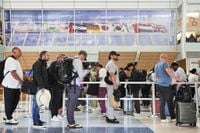The skies above Dallas, usually humming with the constant comings and goings of aircraft, fell eerily quiet on September 19, 2025. Thousands of travelers found themselves stuck in terminals or stranded on tarmacs as a massive telecommunications outage forced the Federal Aviation Administration (FAA) to halt and slow flights at both Dallas-Fort Worth International Airport (DFW) and Dallas Love Field. The ripple effects of that single technical failure were felt across the nation, exposing deep vulnerabilities in America’s air travel infrastructure and leaving a trail of missed connections, disrupted plans, and mounting frustration.
According to The Dallas Morning News, the FAA issued a ground stop for both DFW and Love Field airports due to a telephone outage traced back to a local telephone company’s equipment. In a statement, the agency clarified, “The FAA is slowing flights at Dallas Love Field and Dallas-Fort Worth International Airport due to a reported local telephone company equipment issue that does not involve FAA equipment.” The agency emphasized that it was working closely with the telephone company to determine the root cause and restore service as quickly as possible.
Initially, the ground stops were set to last until 5 p.m. local time, with the FAA estimating a 30% to 60% chance of needing to extend the advisory. The impact was immediate and severe. By mid-afternoon, DFW—one of the country’s busiest airports—was experiencing an average delay of 68 minutes, with Love Field reporting an average delay of 28 minutes. According to FlightAware data cited by The Dallas Morning News, DFW had racked up 626 delays and 172 cancellations as of 4 p.m., while Love Field logged 158 delays and a single cancellation.
But those numbers only hint at the chaos on the ground. As Newsweek reported, by late Friday afternoon, nearly 1,800 flights were delayed and hundreds canceled nationwide, as the ripple effects of the Dallas outage spread far and wide. DFW alone saw about 700 delays and 200 cancellations, while Love Field experienced 160 delays and at least one cancellation. The FAA’s decision to halt departures into DFW until 11 p.m. Eastern Time (10 p.m. Central) and into Love Field until at least 8:45 p.m. Eastern (7:45 p.m. Central) meant that the disruption stretched well into the evening, with delays expected to continue overnight and into the next day.
The outage wasn’t limited to just the big two Dallas airports. The FAA also issued ground stops for flights departing to Fort Worth Alliance Airport and Fort Worth Meacham International Airport, though details about whether those stops were directly related to the same telecommunications issue remained unclear.
For travelers, the outage was more than just an inconvenience. One woman from Allen, Texas, hoping to visit her son in the military in Florida, told CBS News that she would miss the trip entirely. “I haven’t seen him in about 10 months,” she lamented. “Sadly, all the flights tomorrow are booked also, so I’ll be missing my weekend with him.” Another passenger, stuck on her first solo trip, described a two-and-a-half-hour flight turning into a seven-hour ordeal after being rerouted to Oklahoma. “People were annoyed. Some almost drove home,” she recalled.
Matt Yonchak, a frequent traveler at Dallas Love Field, captured the mood succinctly: “Honestly, I have the worst travel luck ever,” he told WFAA. “I just kept getting half-hour delays, pretty much every half hour on the half hour from Southwest.” For Mel Lam, whose flight to Dallas was canceled, the disruption was even more acute. “I tried to get a flight even to Austin. I could just drive from there since it’s three hours from Dallas, nothing. Nothing in San Antonio, nothing in Austin, nothing in Tulsa,” she said.
Southwest Airlines, which operates out of 18 of Love Field’s 20 gates, reported more than 1,100 delays—about 27 percent of its flights—on September 19, 2025, according to Newsweek. American Airlines, which runs its mega-hub at DFW, canceled more than 200 flights and delayed over 500, impacting roughly a quarter of its schedule. The airline responded by allowing affected customers to rebook without change fees, urging travelers to check its website for the latest updates.
The FAA, for its part, maintained that the telecommunications issue was not related to its own equipment. In an air traffic control recording obtained by WFAA, an official could be heard saying, “The entire metroplex took a hit. Right now, we’ve lost all radar and phone communications.” The agency was quick to clarify that the problems in Dallas were not linked to the aging equipment or the nationwide shortage of air traffic controllers that had disrupted flights at other airports earlier in the year.
Still, the incident cast a spotlight on the fragility of the nation’s air traffic system. As Newsweek pointed out, the outage came just one day after the FAA slowed flights into Denver International Airport due to automation problems that required manual handoffs between controllers. FAA leaders have admitted that the system experiences “tech issues almost every day,” and public alarm has been mounting over near-misses, staffing shortages, and even deadly accidents—such as the January crash involving an American Airlines jet and a U.S. Army helicopter.
Congress has responded by approving $12.5 billion to modernize the country’s aging air traffic control network and hire thousands more controllers. But as federal officials and industry insiders alike acknowledge, these efforts will take years to bear fruit. “I feel like our technology should be better than what it is right now for this stuff not to happen,” Mel Lam told WFAA, echoing the frustrations of many travelers caught up in the chaos.
By the night of September 19, the FAA had lifted the ground stop at DFW, but delays persisted into September 20. Both the FAA and airport officials urged passengers to check with airlines for the latest flight status and accommodation information. A spokesperson for Dallas Love Field told Newsweek, “Passenger safety is DAL’s top priority, and we are in constant communication with our partners, including the FAA, as they work to manage the situation and minimize disruptions.”
As the dust settles, the Dallas outage serves as a stark reminder: in an era of record travel demand, even a single point of failure can cascade into nationwide gridlock. With modernization efforts underway but years from completion, the nation’s travelers and aviation officials alike are left hoping that the next technical hiccup won’t ground their plans—or the country’s skies—again.





